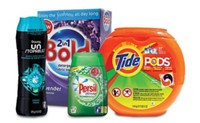Advertisement
Grab your lab coat. Let's get started
Welcome!
Welcome!
Create an account below to get 6 C&EN articles per month, receive newsletters and more - all free.
It seems this is your first time logging in online. Please enter the following information to continue.
As an ACS member you automatically get access to this site. All we need is few more details to create your reading experience.
Not you? Sign in with a different account.
Not you? Sign in with a different account.
ERROR 1
ERROR 1
ERROR 2
ERROR 2
ERROR 2
ERROR 2
ERROR 2
Password and Confirm password must match.
If you have an ACS member number, please enter it here so we can link this account to your membership. (optional)
ERROR 2
ACS values your privacy. By submitting your information, you are gaining access to C&EN and subscribing to our weekly newsletter. We use the information you provide to make your reading experience better, and we will never sell your data to third party members.
Consumer Products
Biobased boomed at In-cosmetics 2022
The ingredients conference returned to an in-person format in Paris
by Craig Bettenhausen
April 8, 2022

In-cosmetics Global, the premier conference for cosmetic and personal care ingredients, welcomed attendees back to Paris after a two-year hiatus with a packed conference hall and a flurry of product launches.
Cannabis chemistry had a strong showing, especially in a section of the floor dedicated to new exhibitors.
Several companies were on hand to pitch plant-based or fermented cannabinoid active ingredients, which executives described as useful as preservatives, antioxidants, and stimulants for DNA repair and skin healing. Personal care marks yet another area of the chemistry world that the cannabis sector has invaded, after winning substantial interest and floor space at instrumentation and analytical conferences as well as medical and general chemistry meetings.
In a sign of the category’s growing legitimacy, just before the conference the specialty chemical giant Evonik Industries unveiled a partnership with the cannabinoid specialist Demetrix in which the two firms will explore so-called rare cannabinoids as skin care active ingredients. Demetrix uses engineered yeast to produce cannabigerol (CBG), a non-psychoactive cannabinoid that is the biological precursor for most other cannabinoids. The firm then turns CBG into other desired molecules using classical and enzymatic synthesis. Demetrix’s chief business officer, Cindy Bryant, said the firm is working on a series B fundraising round now.
Sustainability was another major theme at the meeting. In the personal care sector, as in the cleaning products industry, the conversation around sustainability is focused less on carbon dioxide emissions than it is on biodegradability and sourcing from natural biomass. The percentage of carbon derived from biomass was a key metric found on virtually all product data sheets that ingredient suppliers were handing out.
“Upcycled” ingredients were scattered throughout exhibit booths and in the innovation and sustainability showcases. They are made from waste materials such as coffee bean skins, vineyard waste, rice husks, and algal blooms. Amarjit Sahota, president of the sustainability consulting firm Ecovia Intelligence, said upcycling is surging in the personal care and food ingredients world. Barely on the radar when In-cosmetics last met in person in 2019, the concept appeared in nearly every row in the exhibition hall this year.
By using waste to create new products, upcycling promises manufacturing circularity. But many in the biobased chemical community are starting to question if there’s enough waste biomass available to make all the desired cosmetic and food ingredients, chemicals, and fuels. Biomass sources that are cheap or free now may become pricey in the coming years.
Another motif at the meeting was solid product formats, especially for shampoo, bodywash, conditioner, and lotion. The format can require new surfactants that are solid themselves or effective at very low concentrations. But it can also mean a shift back toward traditional solid soaps that are blended with specialized surfactants and other ingredients to boost foam and creaminess to the levels customers have come to expect in the bathroom.
The solid format specialist Stephenson Personal Care was in Paris offering both traditional saponified oil bases and “syndet” solid bases based on newer detergent chemistries. Paul Pickering, head of sales, said the firm has seen a sharp rise in inquiries for its products.
The move to solid and other concentrated or waterless products is often couched as a sustainability play. Proponents say solid versions of traditionally liquid products can decrease the amount of water used in manufacturing, cut emissions related to shipping water-laden products around the world, and reduce or eliminate plastic packaging.
Overall, the cosmetic ingredient industry seemed excited to return to meeting in person—especially to In-cosmetics in Paris, which is a highlight on the travel schedule of many in the chemical and personal care businesses. Attendees were eager to see old colleagues and make new connections.
They were also there for the new, and on that front Paris did not disappoint. Jeff Yeh is the vice president for personal care at CarbonWave, a start-up launching an emulsifier made from the sargassum seaweed that has been befouling beaches in Cancun, Mexico. Yeh said at a presentation on the morning of the event’s last day that CarbonWave tripled the number of firms interested in testing its offering over the course of the three-day meeting.





Join the conversation
Contact the reporter
Submit a Letter to the Editor for publication
Engage with us on Twitter